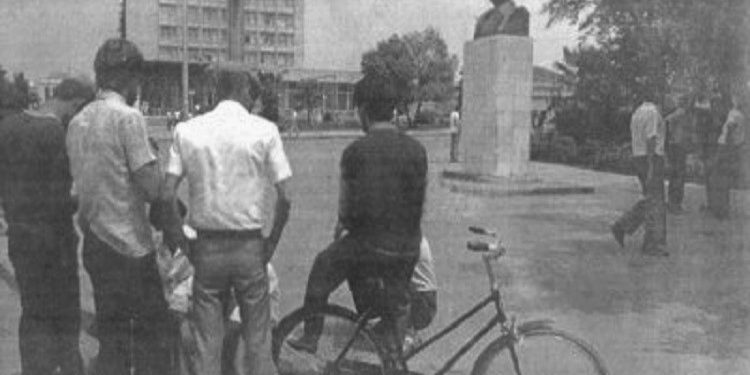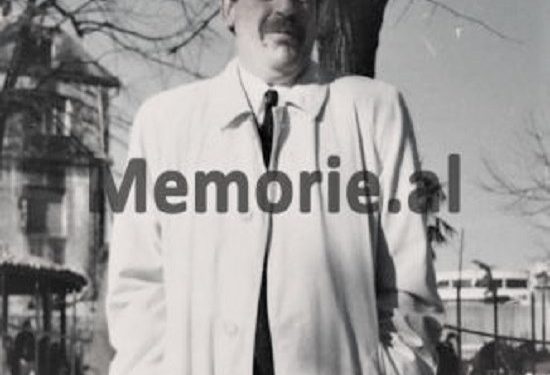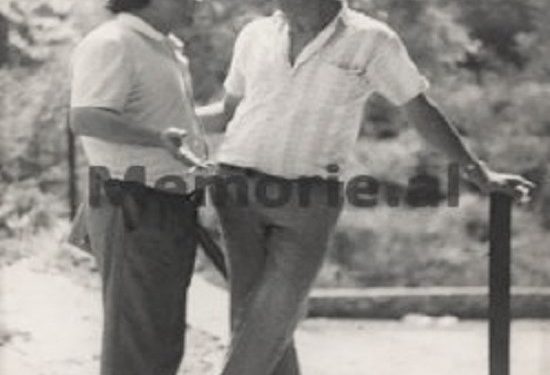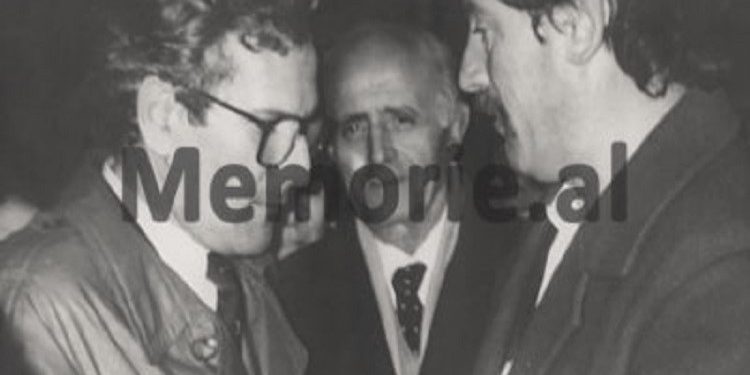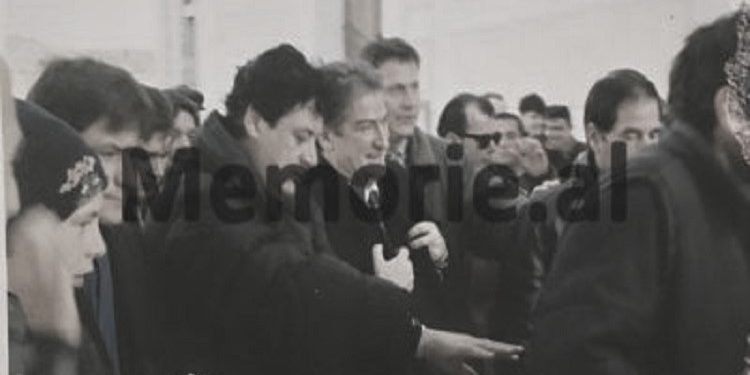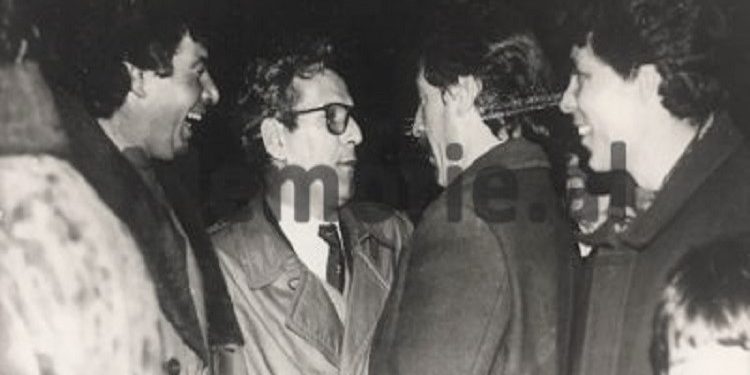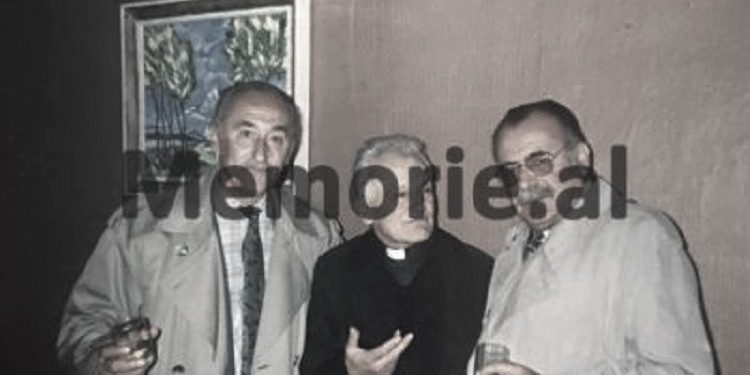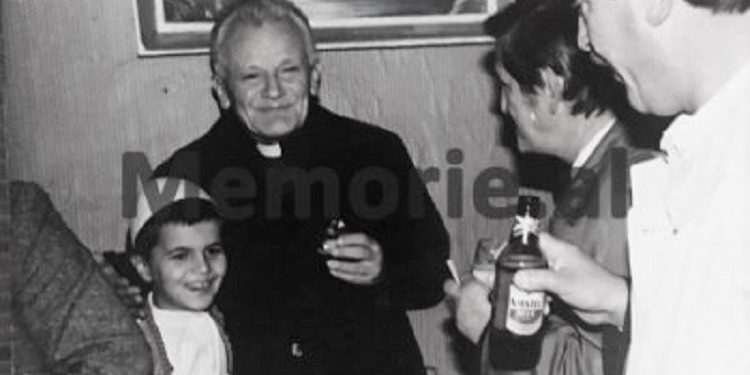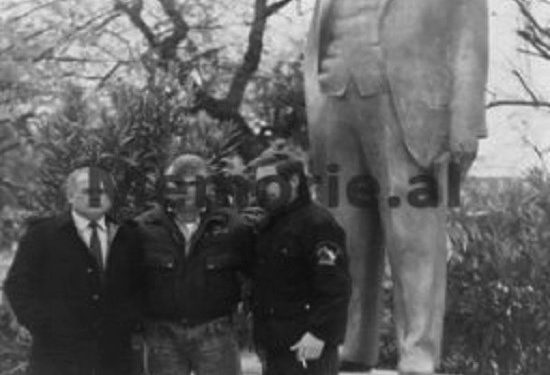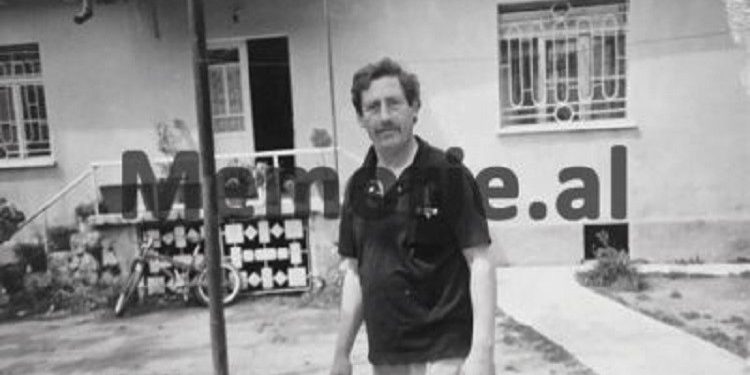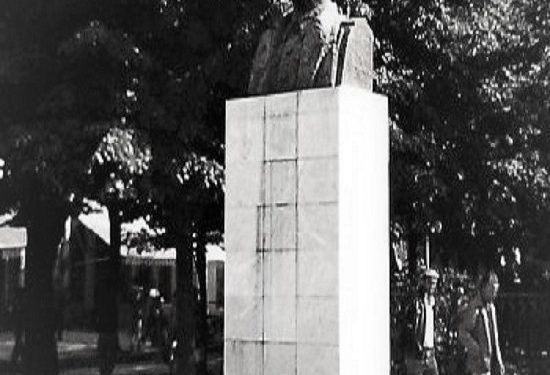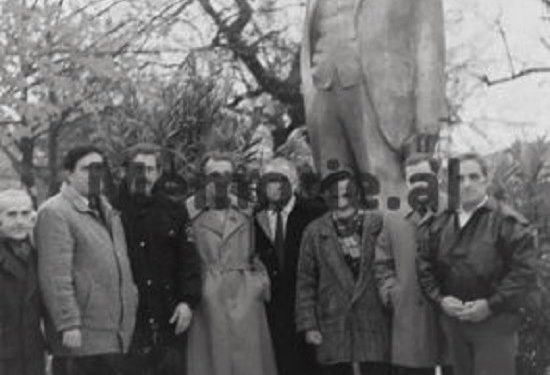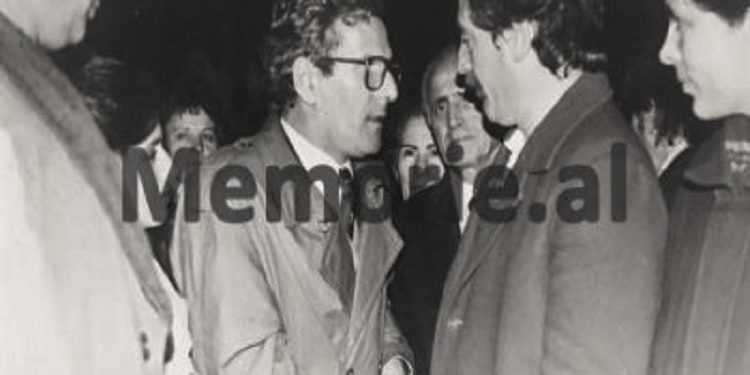Dashnor Kaloçi
Memorie.al publishes an unknown story in the city of Shkodra from January 11 to January 14, 1990, when a group of boys from this town headed by: Rin Monajka, Flamur Elbasani, Dede Kasneci, Gjergj Livadhin, Viktor Martinin, etc., organized in secret and decided to stage a protest in downtown Stalin’s bust, demanding his removal. The testimony of Gjergj Livadhi, one of the main protagonists and organizers of that demonstration that shook the communist regime in Tirana and was followed by some of the world’s most important media, such as Reuters, Rai, Voice of America, etc., who were the two originators to blow up Stalin’s bust, why Dom Simon Jubani refused to give a word on the occasion of the demonstration, who was the young man Kolec Kublina who took over the act, what German ambassador Rhin Monajka told some at the meeting seconds in downtown Shkodra and how did State Security arrest Zylyftar Ramiz and the Special Forces arriving from Tirana all the organizers of that protest the night before it was held?
On the morning of January 14, 1990, thousands of residents of the city of Shkodra gathered in the center of the city and for several hours held a silent protest rally aimed at the demolition of a Stalin monument in one of the parks. of the main squares of that city. That massive demonstration, which marked the first anti-Communist protest after more than half a century of Enver Hoxha’s communist regime, alarmed the regime and also made a lot of noise inside and outside the country, being commented on by many foreign television stations. celebrities like Reuters, Rai, Voice of America, BBC, etc. Likewise, the demonstration of January 14, 1990, shook the foundations of Albania’s top communist leadership and personally Ramiz Alina, who “billed” it to foreign services and mainly to the Yugoslav UDB. In addition to the dictatorial organs that Ramiz Alia used to crush that demonstration, he also mobilized the entire arsenal of propaganda tools that the regime had at that time, and in one of his speeches on exactly that event, he articulated the phrase: “No Taraboshi is shaken by the wind. ”
But who were the main organizers of that demonstration, and when did the idea for the fall of Stalin’s bust in Shkodra first emerge? Who was the person who met with the German ambassador in the morning of January 11 in downtown Shkodra and what was discussed between them regarding the demonstration and bust down? Who were the Shkodra intellectuals who were asked to keep a word of the case before the demonstration and what was the response of Dom Simon Juban? How did State Security learn the truth about demonstration development and how did it arrest all its organizers in the wee hours of January 13th? How were they tortured in the office of the Head of Shkodra Interior Branch, Chapajev Taci in the presence of Deputy Minister and Security Director, Zylyftar Ramizi? What they were asked during the investigation and why the President of the Tirana Court, Sh. M., gave too severe punishments to the ten organizers of that demonstration? Why were the ten main organizers and protagonists of that demonstration the last to be released from the communist regime’s prisons in March 1991, and what is the truth of the death in Austria of the person who had met and talked with the German ambassador, three days before the demonstration on January 11, 1990?
Regarding these unknown events and stories and all the details of that demonstration, he introduces us to his exclusive interview with Memorie.al Gjergj Livadhi, one of its leading organizers and also one of the exponents of democratic processes in the city of Shkodra. the beginning of the 90s.
Mr. Gjergj, before talking about the demonstration and all the other events surrounding the removal of Stalin’s bust, can you first tell us something about your family and your past. When were you born, where did you live and where did you work until you were involved in organizing the demonstration of 14 January 1990 in Shkodra?
I was born on April 27, 1952 in the city of Shkodra. My father, Kol Beka in 1945-’46 was on the mountain as an anti-Communist with George Vata and other nationalists of that time. Given this fact, our father and we as a family did not love Enver Hoxha’s communist regime spiritually, although we did not observe it. We lived in the Serreq neighborhood of Shkodra and we were a poor family who saw our own. In the 1990s, when there was a demonstration of the collapse of Stalin’s bust, I worked at the Metal Enterprise in Shkodra, but by that time I had been doing a variety of manual work.
When and who was the one who first put the idea of Stalin’s bust down in the city of Shkodra?
As far as I know, the idea for the fall of Stalin’s bust in the city of Shkodra was originally put forward by Dede Kasneci with Rini Monajka. The two met and talked for a long time, in the afternoon of January 10, 1990, just three days before the people of Shkodra held a silent demonstration in front of the Stalin monument in the park where today is the monument of Luigj Gurakuqi.
After that conversation, how did Deda work with Rini to get that thing done and with whom else did they talk?
On the morning of January 11, the day after that conversation, Rin Monajka, whom I had a close friend, came and met me there in the Serreq neighborhood and told me about the conversation he had had with Deda the day before. After that he told me that on that day, January 11th, there would be a silent demonstration in downtown Shkodra in protest of the removal of Stalin’s bust and ordered me to gather as many people as possible brought to that protest rally.
How did you respond to the call that Rini Monajka made to you?
I immediately expressed my readiness to the Rhine Monajka and asked if she was sure that the demonstration would take place and he told me: “It will be done because some Italian television stations have given it, but try to Bring as many people as possible from the Serreq neighborhood.
After talking with Rin Monajka, did you gather people and go to downtown Shkodra where it was said that there would be a silent demonstration?
Immediately after talking to the Rhine, I went to my neighborhood of Serreq and for about 30 minutes gathered about 100 people and immediately went downtown with Stalin’s bust.
Were there other people in the square?
We found very few people there and among them were Dede Kasneci with Flamur Elbasani. The presence of those few people in the square was linked to the fact that words circulating everywhere in the city of Shkodra about the fall of Stalin’s bust had fallen on the State Security ear and to prevent any unexpected, an order had been given from above. that January 11, as an official holiday, was a day off. So that was the reason that the morning of January 11, which marked the beginning of the silent revolt over the fall of Stalin’s bust, there were very few people in the square.
What did you talk to your two friends, Kasneci and Elbasani there in the square?
As soon as I met Deda and the Flag, we started talking to each other about how to blow up Stalin’s monument. After talking for about 10-15 minutes, I skipped a bit and headed up to Big Coffee, where I met Pier Deda and Bik Denik. I told them not to leave because we would blow up Stalin’s torso. After that I went back to where the Deda were with the Flag and parted with each other, letting the bust drop on January 14th. ”
Before you split up, did you make plans on how you would topple the bust?
Of course, we made concrete plans deciding everything we would do by January 14th that would topple the bust. But in bracket I wanted to show that at the time I was talking to Dede Kasneci and Flamur Elbasani, so in the morning of January 11, the German ambassador from Tirana had come to Tirana from Shkodra, who had met and talked with a our friend Rini.
Where and how was this meeting between them…?
The meeting had taken place in the middle of the city and had been seen by dozens who were by chance at the moment in Piacenza.
Who was Rhin Monajka and what conversation took place between him and the German ambassador?
Rini Monajka was born and raised in the city of Shkodra. He was a young man, highly cultured and very intelligent by nature. Young was not very educated, but self-taught he had learned for years and knew some foreign languages very well at the time. One of the languages he knew best was German, and if I am not mistaken, it was related to the fact that from his ancestors he had a blood relation with Austria. So, given that Rin Monajka knew German well, he took advantage of the moment when the German ambassador was driving slowly in his car on the main streets of downtown Shkodra and met him. At that time, the German ambassador stopped the car and lowered the glass, talking for two or three minutes with the Rini.
What did they talk about… ?!
The brief conversation between him and the German ambassador was about Stalin’s bust and the foreign diplomat had said to him, “Hey! What are you waiting for? ” All this I am telling you, Rini himself told us later and he was very excited about the meeting he had with the German ambassador.
You said a little bit above that before you parted with Deda Kasneci and Flamur Elbasani, you made plans on how you would act to bring down the bust on January 14th. More specifically what did your plans aim for?
The first point of our plan was that by January 14th we would go to every neighborhood and work center to propagate that day to get as many people as possible into the square. Likewise one of the other not less important points was that of finding a person, possibly a well-known intellectual, who would give a brief speech before the bust before it was blown up. These were two of the highlights we talked about in the beginning, and everything else that would come up, we would talk about in the frequent meetings we would have in those days, until January 14th.
According to your plan, did you get in touch with any of the Shkodra intellectuals who would deliver the speech before the bust?
At first we got in touch with some intellectuals who we thought would be ready for our request, but that was almost impossible and no one took over. It was more than normal, given that it was January 1990, when the communist regime was still strong and embassy events had not yet begun, the arrival of Perez De Kuelari in Albania, or other events that followed. Later. So, I wanted to say that it was not easy at that time to take on the people of downtown Shkodra and speak out against official politics. It was kind of like going to jail with your feet.
Can you tell us any of the Shkodra intellectuals you proposed at the time to deliver the speech before the Stalin bust was blown up?
I don’t want to mention names, but one of them is my friend, Dom Simon Jubani we talked to for a long time. Dom Simon told us: “I am a clergyman and I am not allowed to come to that protest and deal with politics. If you want, I am ready to come to any gathering and talk and protest about allowing religion, opening churches, and other cult objects. It should be borne in mind that Dom Simon had been imprisoned for two years, not even remembering himself, being one of the heroes of the anti-Communist resistance in the camps and prisons of Enver Hoxha openly declared as an enemy and enemy of that system!
After the refusals you had, how did you decide then who would keep the word before the bust crashes?
After some contact with various intellectuals in our city, we were met by a young man named Kolec Hublina. He was a very smart and cultured guy who did not like the Communist regime in power at all. The college undertook to read a letter to all the people.
In addition to Dede Kasneci, Flamur Elbasani, Rin Monajka and you personally, who were the other persons involved in organizing the demonstration that would take place on January 14th to topple Stalin’s bust?
Beside us were the two brothers Haxhi, Ndoc Liqejza, Gjovalin Ralba, Victor Martini, Nikolin Thana, Tonin Dema, Nikolin Margjini, Bac Bilali, Ylli Gërshana, Klaudio Daka, Aldo Perizi, the two brothers Alibali, a son of Gucia, his wife and Tef Curran, Huana Kraja, sister of Vera Omari, etc., for the moment I can’t remember their names.
Mr. Gjergj, how did things turn out after the January 11 morning where there were very few people in the square?
On the afternoon of January 11th, I met again with Dede Kasneci, Rin Monajka, Flamur Elbasani and a few other friends, and we had long talks about holding a demonstration on the morning of January 14th where we were thinking of blowing up Stalin’s torso. After that meeting where we shared tasks with each other, we were scattered throughout our neighborhoods making propaganda, telling all the people we met that: on January 14, they had to go out to the main square of the city”.
How many meetings did you have per day, where did you run them and were you afraid of being followed and monitored by State Security?
We met four or five times a day and held meetings in some of our towns, mainly in the Serreq neighborhood, because of the very composition of its inhabitants, with people who were opposed to that regime, we felt safer.
What about other neighborhoods…?
In addition to the Serreq neighborhood, we also met in piacas. As for what you asked, if we were afraid of being followed by the Security, to say the truth those days we didn’t ask much, since we had knives in the marrow and calls and reminders to come out to the demonstration, we did so openly without fear that the Security could follow and oversee us. At least at that time I was fully convinced that the system was not very long. And my conviction I didn’t hesitate to openly say inappropriate place, saying, “These bulls are over, it’s not long.”
But what about the arrival of the German ambassador to Shkodra and the brief meeting he had with Rhin Monajka, did the State Security know?
It is certain that the State Security was aware of the arrival of the German ambassador and his meeting with Rin Monajka in the center of Piacia, as it is well known that all foreign diplomats accredited in Tirana at that time were being followed by a special detachment. To the Ministry of the Interior, just coming out of their embassy or residence.
In fact, did your group dealing with the organization of the January 14 demonstration fall into the eye of the Security and was it followed?
Security had definitely fallen in our tracks and followed us everywhere, but apparently they didn’t arrest us from the beginning, as they wanted to find out all the members of the group and find out what we had decided to do. The Deputy Minister of Internal Affairs, Zylyftar Ramizi, who was also in the position of Director of State Security, came to Tirana from Shkodra himself.
How did you learn about the presence of Zylyftar Ramiz in the city of Shkodra in those days?
I have contacted myself with the Deputy Minister of Interior and when I recall my chance meeting with Zylyftar Ramiz at one of the premises of Shkodra on the morning of January 13th, I honestly come to laugh at what I said to him and yes I tell you, they will look untrue.
How did that meeting happen and what did you say to Zylyftar Ramizi?
On that day, then, on the morning of January 13, I and my friend Nikolin Thana (a former Brotherhood footballer and, after the 90s, a senior officer in the Ministry of Public Order), went to a bar (which today it no longer exists after it broke down) and there we met some of our friends who we announced were going to demonstrate the next day on January 14th. Likewise, besides them, everyone we met, known and unknown, told them not to miss the demonstration the next day. I also told him Zylyftar Ramiz, who was leaning against the counter of that bar where we entered, drinking coffee or cognac. He had put a cassette on his head and listened quietly to what was being said.
In fact, did you know Zylyftar Ramizi?
Not only I did not know him, but I believe there were few people in Shkodra who could know him.
What did you say to Zylyftar Ramiz and how did he respond?
I addressed him, just like everyone else, telling him not to miss the demonstration the next day. After those words, he got scared and went out immediately without telling me a word.
Did you suspect that man, and when did you find out that the person you had asked to come to the demonstration was the Deputy Minister of Internal Affairs himself and at the same time the Director of State Security?
Frankly speaking, from his attitude and outward appearance, I created no doubt, thinking that he would be just one of those fanatical Communists who had regular contact with the Inner Branch and never mind, he was the Director of State Security himself, the terrible Zylyftar Ramizi.
When did you find out who you were dealing with?
I learned that only a few hours later, ie. in the late afternoon of January 14th, when numerous special forces arriving in Tirana, along with those from the Shkodra Interior Branch, came to my house and arrested me.
Before asking you about your arrest, we wanted to know what preparations you made on January 13th for the demonstration you had decided to do the following day, January 14th?
On the afternoon of January 13, we made a bunch of anti-Communist slogans and distributed them in the Parruca neighborhood. We did it in order to get the attention of the residents of that neighborhood too, where we thought we would not have much support for the demonstration.
Who wrote those banners and who distributed them?
I do not remember who handled the writing of the slogans and their distribution, as the Martini brothers were taken with Ndoc Liqejza.
In addition to distributing those banners in the neighborhood of Parrucca, what else did you do on January 13th regarding organizing the demonstration that you had the next day?
In addition to the slogans we distributed, we continued to make calls and reminders in every neighborhood and workplace so no one was missing on January 14th. Likewise, we had found the person who would give a brief speech before Stalin’s bust, who, as I told you, was Kolec Kublina. So, in a nutshell, we had almost taken all the measures needed to develop the demonstration, and we were looking forward to the day dawning and getting to the square. But unfortunately, as I told you, our great desire to be present at that protest demonstration did not materialize, as most of the people involved in organizing the demonstration were arrested by the State Security in the late hours of the night. daybreak January 14th.
More specifically, how did your arrest happen?
By midnight on January 14, numerous forces from the Shkodra Interior Branch and those Special Forces arrivals from Tirana had surrounded my home there in the Serreq neighborhood. Some of them, along with our ward’s operative, came and knocked on the door telling me to go with them to the Branch for some explanation, I went right after them to the Branch, making my way to the foot, after my house it was not far from it. ”
Who did you face at the Interior Branch and what did you say there?
As soon as I was put in the premises of the Branch, I was immediately handcuffed and taken to the office of the President, Çapajev Taci. Apart from Çapajev, Zylyftar Ramizi was also in the office with one of the other Deputy Ministers of the Interior at the time, whom I currently cannot remember. As soon as I saw Zylyftar, I immediately recognized that he was the person I had spoken to at the bar when I was with Nicole Thana, and given the way others were there, I immediately became convinced that he was their greatest. As soon as I was brought into that office, Zylyftar Ramizi addressed me, saying, “Have we met together this morning?”
How did you respond?
He remembered me very well and I neither accepted nor objected to him saying, “Somewhere we have been seen.” After that they started accusing me of saying, “You are agitating and propagating terrorism and you are driven by foreign agents of the Yugoslav UDB.” At that moment, without finishing the word Zylyftar Ramizi, the Special Forces had arrived at the office of Çapajev Taci, who had arrived from Tirana. They immediately hit me with a rubber stick, hitting me where they could. I remember that from that moment until the morning when the light was gone, I was 8 times faint from their strokes. Memorie.al
follows tomorrow




